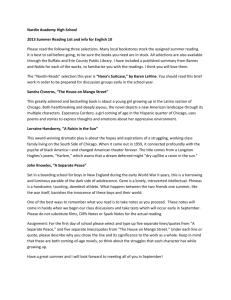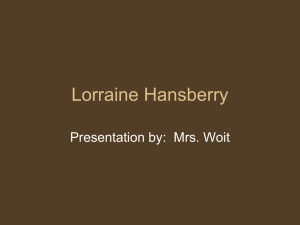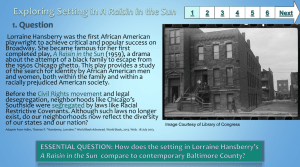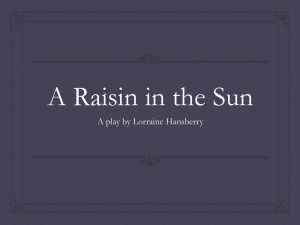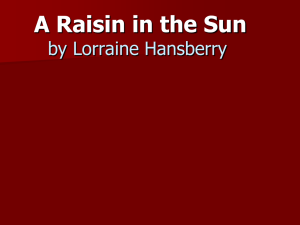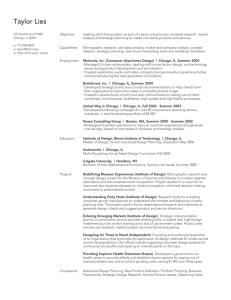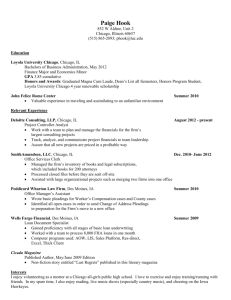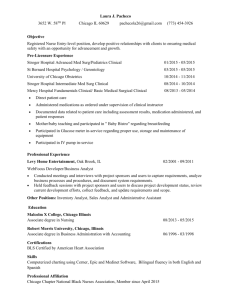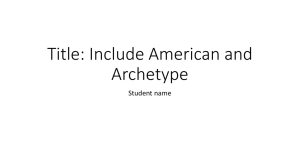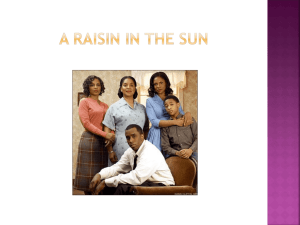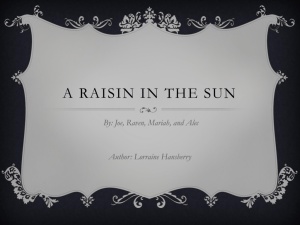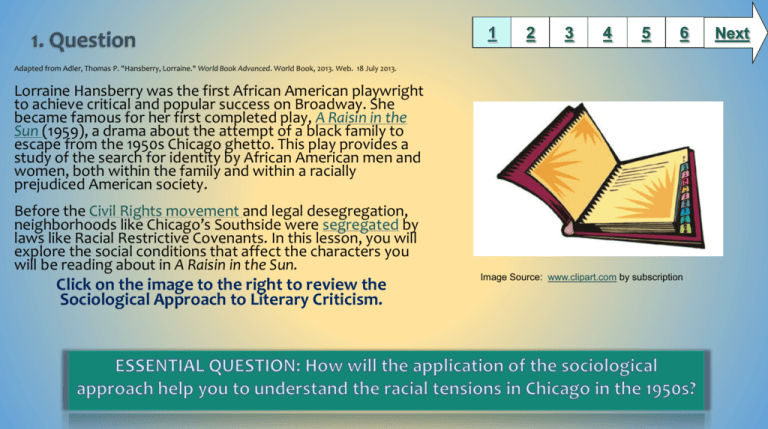
1
2
3
4
5
6
Adapted from Adler, Thomas P. "Hansberry, Lorraine." World Book Advanced. World Book, 2013. Web. 18 July 2013.
Lorraine Hansberry was the first African American playwright
to achieve critical and popular success on Broadway. She
became famous for her first completed play, A Raisin in the
Sun (1959), a drama about the attempt of a black family to
escape from the 1950s Chicago ghetto. This play provides a
study of the search for identity by African American men and
women, both within the family and within a racially
prejudiced American society.
Before the Civil Rights movement and legal desegregation,
neighborhoods like Chicago’s Southside were segregated by
laws like Racial Restrictive Covenants. In this lesson, you will
explore the social conditions that affect the characters you
will be reading about in A Raisin in the Sun.
Click on the image to the right to review the
Sociological Approach to Literary Criticism.
Image Source: www.clipart.com by subscription
Next
1
2
3
4
5
6
Next
You will use these resources to complete the Student Activity on Slide 3.
• Readings from SIRS Decades database:
*You must first click here to authenticate, then
return to this slide open the links below:
• The 1950’s: Everyday Life
• The 1950’s: Race and Ethnic Relations
• On Being Prejudiced in a Lily-White Community
• Racial Restrictive Covenants Map
• Hansberry’s Victory over Restrictive Covenants
(video)
• Housing Segregation in Chicago in the 1950’s
This is a picture of a Chicago Segregation Protest around 1953.
Image Source: SIRS Decade by subscription
1
2
3
4
5
6
Next
Use these Cornell Notes to take notes on the
Information Sources on Slide 2. You will be using
these notes to complete the Assessment Activity
on Slide 4.
Review the Essential Question which you are
researching:
Image Source: www.clipart.com by subscription
1
2
Now you will create a one-pager in order
to answer the essential question:
How will the application of the sociological
approach help you to understand the racial
tensions in Chicago in the 1950s?
Be sure to use information from your
Cornell Notes and carefully read the
Scoring Guide at the bottom of the onepager so that you know how you will be
assessed.
Image Source: Library of Congress
3
4
5
6
Next
1
2
3
4
5
6
Next
Extend your knowledge by reviewing these
resources. After you have read A Raisin in the Sun,
these resources can be used to help you apply the
historical and biographical approaches to literary
criticism.
Chicago Black Renaissance
History of Fair Housing
Dr. Martin Luther King, Jr.’s Chicago Crusade (video/article)
Lorraine Hansberry:
Image Source: Library of Congress
Her Chicago Law Story
1
Grade 7 GT English Language Arts, Unit 3
Common Core State Standards
Reading: CCRA.R.1. Read closely to determine what the text says explicitly and to
make logical inferences from it; cite specific textual evidence when writing or
speaking to support conclusions drawn from the text.
Writing:
CCRA.W.7. Conduct short as well as more sustained research projects based on
focused questions, demonstrating understanding of the subject under
investigation.
ELA-Literacy.W.7.9 Draw evidence from literary or informational texts to support
analysis, reflection, and research.
Standards for the 21st Century Learner
1.1.6 Read, view, and listen for information presented in any format (e.g. textual,
visual, media, digital) in order to make inferences and gather meaning.
2.1.3 Use strategies to draw conclusions from information and apply knowledge to
curricular areas, real-world situations, and further investigations.
ISTE NETS Standards for Students
3. Research and Information Fluency: Students apply digital tools to gather,
evaluate, and use information.
b. Locate, organize, analyze, evaluate, synthesize, and ethically use
information from a variety of sources and media.
4. Critical Thinking, Problem Solving, and Decision Making: Students use critical
thinking skills to plan and conduct research, manage projects, solve problems,
and make informed decisions using appropriate digital tools and resources. c.
Collect and analyze data to identify solutions and/or make informed decisions.
2
3
4
5
6
Time Frame: Two 45 minute class periods
Differentiation:
Direct students to use comprehension tools included in databases, such as:
audio read-aloud, labeled reading levels, and embedded dictionaries.
Articles with a gold star
are of a more challenging readability.
Learning Styles:
Visual, Auditory, Reflective, Global, Analytical
AVID Strategies: Cornell Notes
Notes to the teacher:
To speed up lesson pacing, one class period could be used for research and
note-taking and then the One-Pager could be assigned for homework.
The overview of the Sociological Approach (linked to image on Slide 1) could
be read for homework prior to beginning the Slam Dunk.
Inform students that some of the primary documents include vocabulary that
would not be considered politically correct today. However, it is used in a
historical context and reflects vocabulary used in the 1950’s.
Teacher resource materials on the Literary Criticism Approaches.
After completing the reading of the novel, students can revisit this Slam Dunk
to apply the historical and biographical approaches using the linked graphic
organizers. The resources on Enrichment Slide 5 could be used with these
approaches.
Last updated: July 2014
Created by Alexis Mazur, Library Media Specialist, Revised by Amy L. Samay, Library Media Specialist Intern
BCPS Slam Dunk Research Model, Copyright 2012, Baltimore County Public Schools, MD, all rights reserved. The models may be used for educational, non-profit school use only.
All other uses, transmissions, and duplications are prohibited unless permission is granted expressly. This lesson is based on Jamie McKenzie’s Slam Dunk Lesson module.

